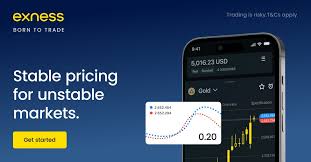Understanding Exness Trading Instruments
Exness is a well-known online trading platform that offers a diverse range of trading instruments to cater to various traders’ needs. Whether you’re a newbie or an experienced trader, Exness Trading Instruments Exness trading offers something for everyone. This article will cover the various types of instruments available for trading on Exness, the advantages and disadvantages of each, and tips on how to choose the right instruments for your trading strategy.
1. Forex Trading Instruments
Forex, or foreign exchange, is one of the most popular trading instruments available on the Exness platform. It involves the trading of currency pairs, allowing traders to capitalize on the fluctuating exchange rates between different currencies. Exness provides access to a wide range of currency pairs, including major pairs like EUR/USD, GBP/USD, and USD/JPY, as well as exotic pairs.
Advantages of Forex Trading
- High Liquidity: Forex is the largest financial market in the world, providing ample opportunities for traders to enter and exit positions with minimal slippage.
- Leverage Options: Exness offers various leverage options, enabling traders to increase their purchasing power and potentially enhance their profits.
- 24/5 Market Availability: Forex trading is available 24 hours a day, five days a week, allowing traders to trade at their convenience.
Disadvantages of Forex Trading
- High Risk: The potential for significant losses is present, especially when using high leverage.
- Complexity: Understanding the factors that influence currency prices can be challenging for beginners.
2. Contracts for Difference (CFDs)
Contracts for Difference (CFDs) are another popular trading instrument available on Exness. CFDs allow traders to speculate on the price movements of various assets without actually owning them. This includes commodities, indices, shares, and more.
Advantages of Trading CFDs
- Diverse Asset Range: Traders can access a wide range of global markets, including commodities like gold and oil, indices like the S&P 500, and stocks.
- No Ownership of Assets: Since CFDs are derivative instruments, traders do not need to own the underlying asset, making it easier to trade using leverage.
Disadvantages of Trading CFDs
- Higher Fees: Trading CFDs can involve higher fees compared to traditional investing, particularly when holding positions overnight.
- Leverage Risks: While leverage can amplify profits, it can also magnify losses, leading to significant risks.
3. Cryptocurrency Trading Instruments
Cryptocurrencies have gained immense popularity in recent years, and Exness offers several options for trading various cryptocurrencies. This includes well-known cryptocurrencies like Bitcoin (BTC), Ethereum (ETH), and Litecoin (LTC). The cryptocurrency market operates 24/7, providing traders with continuous opportunities.

Advantages of Cryptocurrency Trading
- High Volatility: Cryptocurrencies are known for their dramatic price swings, which can present lucrative trading opportunities.
- Decentralized Market: The cryptocurrency market operates independently of traditional financial institutions, allowing for greater accessibility.
Disadvantages of Cryptocurrency Trading
- Market Manipulation: The cryptocurrency market can be susceptible to manipulation due to its relatively small market size compared to other financial markets.
- Security Risks: Cryptocurrency exchanges have been targeted for hacking, leading to potential losses for traders.
4. Commodity Trading Instruments
Exness provides opportunities for trading commodities, including physical goods like gold, silver, oil, and agricultural products. Commodities can serve as a hedge against inflation and other economic uncertainties.
Advantages of Trading Commodities
- Tangible Assets: Commodities represent physical goods that can provide a sense of security to traders.
- Diversification: Adding commodities to a trading portfolio can enhance diversification and reduce overall risk.
Disadvantages of Trading Commodities
- Price Volatility: Prices of commodities can be affected by various external factors, including weather patterns and geopolitical events.
- Storage and Transportation Costs: Investing in physical commodities can involve additional costs, unlike trading futures contracts.
5. Indices Trading Instruments
Indices represent a collection of stocks from various companies within a specific market or sector. Popular indices available for trading on Exness include the FTSE 100, DAX 30, and NASDAQ 100. Trading indices is a great way to gain exposure to the overall market performance.
Advantages of Trading Indices
- Diversification: Indices provide exposure to multiple stocks in one trade, reducing individual stock risk.
- Market Sentiment Indicator: Indices can serve as indicators of market sentiment and economic stability.
Disadvantages of Trading Indices
- Limited Control over Individual Stocks: Traders cannot influence individual stock prices within an index.
- Market Risks: Indices can be affected by broader market fluctuations and economic changes.
Conclusion
Exness trading offers a plethora of trading instruments, allowing traders to diversify their portfolios and enhance their trading strategies. From Forex and CFDs to cryptocurrencies, commodities, and indices, there’s an opportunity for every trader. However, it is crucial to stay informed and conduct thorough research before diving into any market. Understanding the advantages and disadvantages of each trading instrument will empower you to make better trading decisions and align your strategy with your financial goals. Whatever trading instrument you choose, ensure that you utilize proper risk management techniques to safeguard your investments and optimize your trading experience.
